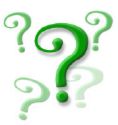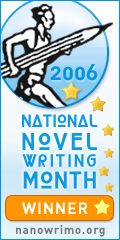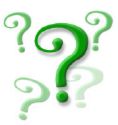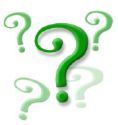
And the final few questions from the students at KSU.
From A.G. --
Would you like to expand to another line of books, such as romance or horror in the future?I'm not a full-blown romance writer. I like a bit of romance in my stories, but to use fully half of the story to set up and deliver a romance doesn't work for me. That's a lot of real estate I could be using to deepen the mystery or complicate the heck out of the characters. I have a number of friends who write romance, a few who make good $$. I wish them well. It's just not in my DNA right now.
As to horror -- well, it depends on how you define the word. Trust me, there's lots of discussion about that. Some folks see horror strictly as slasher sorts of tales. To me horror can be a lot more subtle, that glide of icy cold across your skin on a dark night. That sense that you really are pretty clueless as to the bad things waiting to pounce on you. If you use that definition, I already write horror. I like to take my characters to the edge and see what they find when they peer into the abyss.
From K.F. --
Where do you come up with the lingo (terms) used in your books? Are these common science fiction terms or things you have to come up with?To build a believable world, you have to set up the entire environment, including the nomenclature. For the
Time Rovers Series I created
new terms to fit 2057's technology. For the most part, they're reconstructions of words we currently use. Holo-screen and holo-keyboard, for instance. Nano-drive. Bots for robots. Words that denote a futuristic setting but are readly understandable by readers in 2006. Time Lag is a term that's been used before (Connie Willis' books). [Disclaimer: I didn't read Connie's time travel novels until after I finished the first draft of Sojourn. I was stunned to find we both have time travelers coming from 2057. So you heard it here first, time travel by '057.]
One side note on creating new words -- often fantasy authors go to great lengths to create incredibly detailed lineages for their knights/elves/trolls, whatever. And then give them names you cannot possibly pronounce, even if you go to the back of the book and hack through the pronunciation guide. Terry Pratchett knows how to work around this problem by giving his characters unique names, but ones that are easy to remember. Detritius (a troll), Knobby Knobs (a cop), Gaspode (a dog), Carrott Ironfounderson (another cop). Unique, but memorable. That's the way names should be.
From M.J. --
Why wouldn't you want to have 'Dame Rowling fame'?This question comes from a comment I made during my presentation. I routinely have people who say, "Hey, someday you might be as famous as J.K. Rowling." I usually shudder when they say that. Do I wish Dame Rowling ill? Certainly not. She hit the market with precisely what readers wanted at the time. She's done well and she appears to have a very decent heart. That counts a lot in my book.
I am not seeking Rowling-level fame because of what that entails. Suddenly the world knows you. Even people in the farthest reaches of China know you (from the Chinese
knock-offs of the Potter series). I'm not sure how it works in Scotland, but in the U.S. someone would be following me around when I went to the grocery store and squeezed the melons. Someone would be there when I bought my weekly order of sushi. Photos of important people are ready currency. So for J.K., privacy is the first casualty.
Then there's the pressure. How soon will the next book be out, Ms. Oliver? I get that now and it's a bit uncomfortable. You're thrilled your readers are keen for the next adventure, but in the back of your mind you're fretting over how good that next adventure will be. Multiply that pressure by gazillion and you have Dame Rowling's life. She seems to manage it well and that is to her credit. Still, that's a lot of pressure.
And lastly, the other problem with J.K.'s career is that she hit the top first crack out of the box. Now where does she go? She's 36 years old, worth over a billion U.S. dollars. Her biggest challenge is topping herself. Sure, she could retire and never pen another word. She won't, or more precisely... can't. The writing virus is hard to shake (ask Stephen King).
She's brought new readers into the fold. She has penned what one person called a "Gateway Drug." Once you read about Harry the world opens in front of you. You can go anywhere, anytime and live an adventure.
But wanting to live her life complete with all the responsibilities it entails? I think I'll pass.
From M.G. --
How long is the process of publishing a book?It depends on who publishes it. A small press can put a book out in fairly short order. A big press with a full publishing schedule takes lots longer. Most publishers have their 2007 and early 2008 publishing schedules already set. In the case of Sojourn, Dragon Moon turned that book in four months. That was a special case because of a particular deadline. Usually it's 5-7 months (or longer) depending on editorial staffing commitments, cover designs, layout, etc. The bigger publishers can take anywhere from 9 months to 2 years to get a book on the shelf.
One of the key things that most readers don't know is that publisher issue Advance Reading Copies (ARCs or galleys) to reviewers before the book hits the shelves. Reviewers require at least 3-4 months lead time. If you're hoping for a review in Publisher's Weekly, it's got to be to them at least four months early. That chews up a lot of time before publication.
A question from K.J. --
Would your books be considered mainstream like John Grisham or Janet Evanovitch, or are your readers considered a nitch market? At what volume of sales would a book be considered mainstream? Who would reders compare you with (you are similar to)?If you use the definition found
here then technically I'm mainstream. However, since I am an odd blend of genres it's hard for the bookstores to put me on the shelves. Usually Sojourn is found under FANTASY. But it's also science fiction and historical mystery. So someone looking for a book set in Late Victorian London will most likely not be hunting in the fantasy section. Hence the problem.
I've had folks compare my fantasies to "early Anne McCaffrey". I appreciate that immensely. As to my Victorian book, I've not yet had anyone do a comparison, other than saying I was less dark than
Caleb Carr (The Alienist). I'm not sure if it's a good thing that they can't pair my work up with a more famous author. Either it means I'm really doing my own thing or that no one's made the connection.
From a student whose name I could not read (though the signature is quite lovely) --
Because of the high costs that publishing carries, did you have any initial investors, friends or family members that helped fund your projects, or was it all you?For my self-pubbed works, it was my credit card. Sure made the thing smoke. Now that I'm traditionally published, my publisher has all the expenses related to actual book production. However, I'm now spending more on publicity, etc., so it evens out.
And from T.M. --
You said you love ice cream. What's your favorite flavor?Chocolate Mint and/or Coffee. Yum!!!!!!!!
And finally from C.H. --
If you were a shoe, what kind of shoe would you be and why?A Victorian boot. They were sturdy, reliable, able to handle the muck on the streets and still hold up. Something to be said for a decent set of footwear.
Thanks for asking, folks. It's been a blast.




